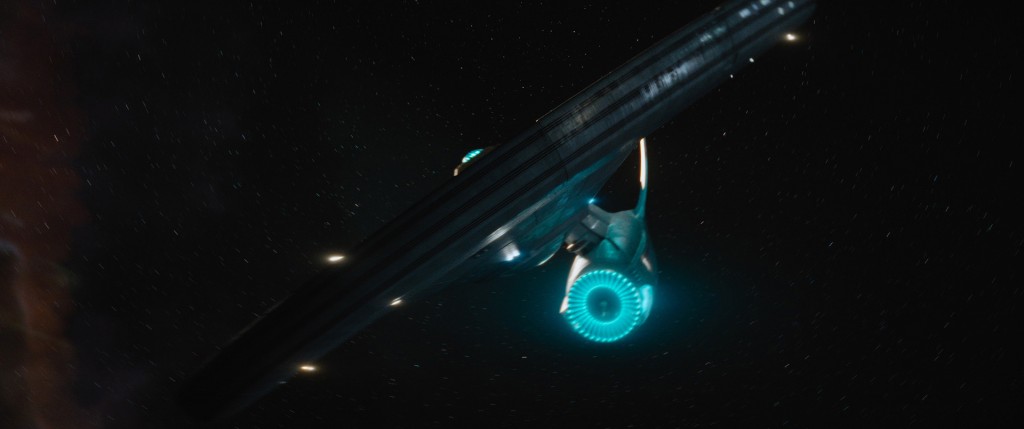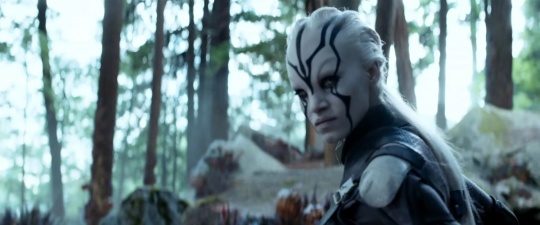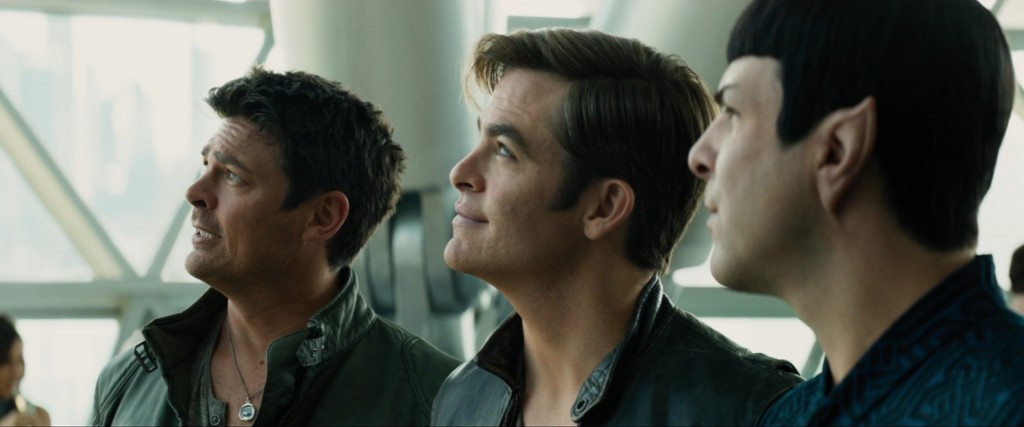Back when action director Justin Lin was first announced to helm the third film in the rebooted Star Trek series, some fans and critics (myself included) were concerned that his selection indicated that Paramount wanted to push the series even further in the direction of Big Flashy Action Blockbuster. Guardians of the Galaxy had just made a mint at the box office, after all, and no doubt rival studios would want to get in on that space comedy money. But just like in 2009, when Abrams surprised the doomsaying Trek faithful with a heartfelt revival of the original series’ spirit of friendship and optimism, Lin has confounded expectations by delivering a film that is leaner, smarter, and much more reminiscent of Star Trek television than either of its immediate predecessors.
Beyond picks up three years into the five-year mission that the Enterprise began at the end of 2013’s Star Trek Into Darkness, and the journey has exhausted Captain James T. Kirk’s (Chris Pine) adventuring spirit. Exploring the galaxy is beginning to feel like a monotonous fool’s errand, and he’s considering taking a desk job at Yorktown, the Federation’s advanced space station colony. But fate intervenes, and soon Kirk and his entire crew find themselves stranded on an alien world controlled by the vicious Krall (Idris Elba). Isolated from each other and from Starfleet, the crew must stop Krall from unleashing a deadly weapon upon Yorktown.
After the last two films focused tightly on Kirk and Spock (Zachary Quinto), Beyond is much more of an ensemble story, the likes of which the Trek film franchise hasn’t seen since 1986’s The Voyage Home. The story splits the main ensemble into pairs, giving each group a fair amount of screen time and a story to tell. Kirk and Spock are separated from one another, allowing the late Anton Yelchin more screen time as Kirk’s foil, and for a delightful subplot that finally gives this universe’s Spock and Doctor McCoy (Karl Urban) some time to explore their unusual friendship. Uhura and Sulu (Zoë Saldana, John Cho) spend the film’s second act as Krall’s prisoners, attempting to protect the rest of the captured crew while learning what makes the villain tick. And Scotty (co-writer Simon Pegg) teams with the alien fighter/tinkerer Jaylah (Sofia Boutella) to repair an old craft that could be the Enterprise crew’s means of escape. While Kirk and Spock are still the only characters with significant character arcs, the rest of the cast benefits from their distance from the two leads.
Though so much of the film has the crew split apart, the moments when they’re all together very convincingly sell the idea that this crew has become a tight-knit family, and their affection towards one another feels very genuine. (This emphasis on quiet feel-good ensemble moments is also a staple of Lin’s Fast films.) This is the first installment in the rebooted series in which the Enterprise crew isn’t at odds with each other—Kirk and Spock don’t butt heads, Uhura and Spock aren’t fighting, nobody ragequits or gets marooned on an ice planet. That the crew has finally become comfortable with each other is one of the elements that makes Beyond feel more like an episode of a Star Trek series than either of Abrams’s contributions.
A lot of factors contribute to that TV feeling, and a lot of them have to do with scale. Beyond’s entire second act is set on a single rocky planet, reminiscent of the famous Vasquez Rocks, California, where so many classic episodes were shot. The story’s not as enormous and epic as the 2009 Trek, nor as grim or heavy as Into Darkness. Beyond is not as visually distinctive or deliberate as the Abrams-helmed installments. The characters’ emotional intensity has been turned down from 11 to about 8; Beyond gently tugs on the audience’s heartstrings where Abrams would have aggressively yanked. It’s more deliberately paced, and each action set piece feels like a consequence of the story rather than the story being built to accommodate set pieces.
This isn’t to say that Star Trek Beyond doesn’t still feature some of that energy and attitude that made the 2009 reboot such a breath of fresh air. Kirk gets to race around on a motorcycle, McCoy says “horseshit,” and the music of the Beastie Boys is featured once again, joined by Public Enemy. The sense of humor that brightened up Star Trek ’09 is alive, but tempered a bit as the characters have aged—it’s getting easier to imagine these actors growing up to become the older crew from The Wrath of Khan or The Undiscovered Country.
Beyond also halts the trend of calling forward to reference “future” events from the Original Series and its films, and instead builds upon some mythology from the oft-maligned prequel series Star Trek: Enterprise, which is the only one of the five live-action Trek television series that remains canon in both the Prime (pre-Abrams) and Kelvin (post-reboot) timelines. A point is made to demonstrate how far humanity has come, not just from modern day, but from its early days traveling space before the formation of the United Federation of Planets. Joining together with other species to share and explore the galaxy has made humans less aggressive and more prosperous, symbolized by the cultural and technological triumph of Yorktown. Krall seeks to destroy that symbol, which represents the dream of Star Trek itself better than the USS Enterprise herself ever has.
Star Trek Beyond is not, by most measures, a better movie than 2009’s Star Trek, but it may be a better pure Star Trek movie than filmgoers have been treated to in twenty years. And with the next installment already greenlit by Paramount and a new Bryan Fuller-helmed TV series set to debut in January, the course of the franchise seems set in a securely Star Trek direction. Thrusters on full.
Star Trek Beyond is in theaters now.




